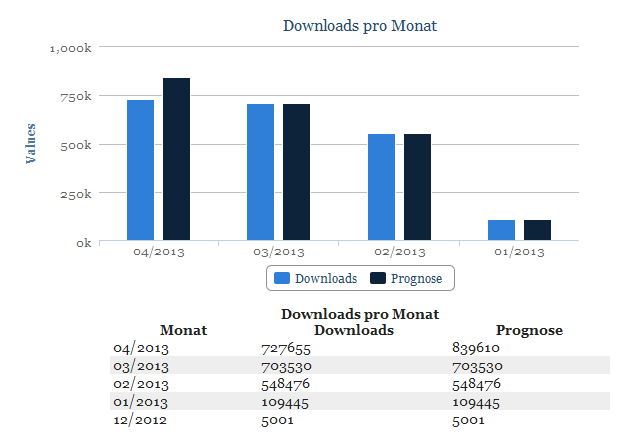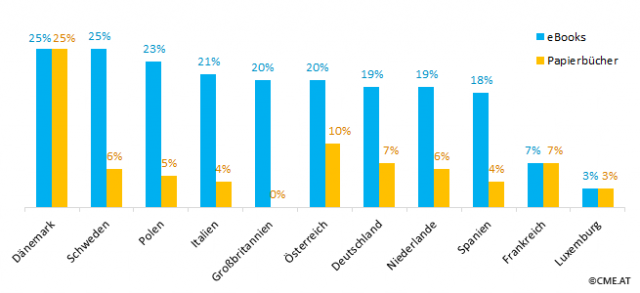“Illegal eBook Platform Reaches Nearly 1 Million Monthly Downloads in Germany”

Currently, news that is not particularly positive for the German eBook market is doing the rounds. One of the largest platforms for illegal eBook downloads is about to reach downloads in the seven-figure range – on a monthly basis.
The platform recently published statistics indicating that in April 2013, they anticipate having 5 million visits. This continues the steady growth seen since the beginning of the year, suggesting that traffic numbers will likely rise further as the year progresses. Moreover, it’s not just visits, but the number of downloads is also increasing.
Illegal Downloads Grow with the eBook Market
While around 540,000 eBooks were downloaded in February 2013, according to their own forecast, about 840,000 will be downloaded in April. The platform’s blog states that many of the titles offered are public domain. However, a closer look at the offerings reveals that a significant number of copyrighted titles are included as well.
With an average eBook price of 8.64 euros (as of September 2012), this results in a significant sum of potential lost sales. However, it should be considered that an illegal download does not necessarily mean that the user would have actually purchased the product. This fact is often ignored by the industry.
Number Games
Nevertheless, these numbers are undeniably alarming for the commercial eBook trade. If you project the current monthly downloads over a year (without considering potential further growth), you end up somewhere around 10 million downloads. In 2012, a total of 12.3 million eBooks were sold in Germany, and for 2013, between 25 and 30 million eBooks are expected to be sold.
The ratio of purchased to legally downloaded free eBooks is about 60:40. Assuming the ratio is similar on the mentioned illegal platform, this would amount to roughly 6 million copyrighted works being downloaded over the course of a year. This represents a total of 20 percent of the entire German eBook market.
Of course, these are rough estimates based on various projections, but they do indicate the direction in which things are moving.
What to Do?
Rights holders are naturally asking themselves: What should we do? The first reflex is to want to shut down the illegal offerings. However, this proves to be quite difficult, because while a blog hosted by Google was taken offline some time ago, the current offering is nearly impossible to shut down due to its foreign server location. Although various actions have been taken against the platform, there’s still the question of whether it is even worth the time and money.
Probably not.
Looking at how illegal digital offerings have evolved in recent years, closing this eBook platform will likely be of little benefit. On the contrary. When Germany’s largest illegal exchange forum was closed years ago, several alternatives quickly sprung up, run by untraceable operators. Now, rights holders must contend with several slightly smaller offerings instead of one large one.
Those who think this is an isolated case are mistaken. Even the much-publicized shutdown of the Kino.to platform did not lead to significant changes. The closure merely resulted in the launch of several other similar platforms. It’s likely to be the same with the potential shutdown of this eBook platform. It’s simply the principle of supply and demand at work, just like in any other market. As long as there is demand for free, even copyrighted, eBook downloads, there will always be corresponding offerings.
Improve the Legal Offering
Instead of focusing solely on something that is unmanageable due to the structure of the internet (as evident from the aforementioned examples), consideration should be given to how to make legal offerings more attractive.
DRM remains a major issue with eBooks, unnecessarily complicating their use. While illegal downloads are hassle-free in this regard, honest buyers find their use of eBooks restricted. Particularly in light of the growing illegal download figures, digital rights management seems hardly effective—why insist on it then?
At the same time, pricing policies should be rethought. Although the VAT on eBooks is higher at 19 percent (and 20 percent in Austria) compared to printed works, the relatively small price difference can hardly be justified. Even though far fewer resources are needed for the production and distribution of an eBook, digital works are often only marginally cheaper.
The music industry also painfully learned that it’s better to improve one’s own offerings than to fight current trends. They had to drop DRM protection to tackle the illegal market effectively. The eBook market should learn from this.


